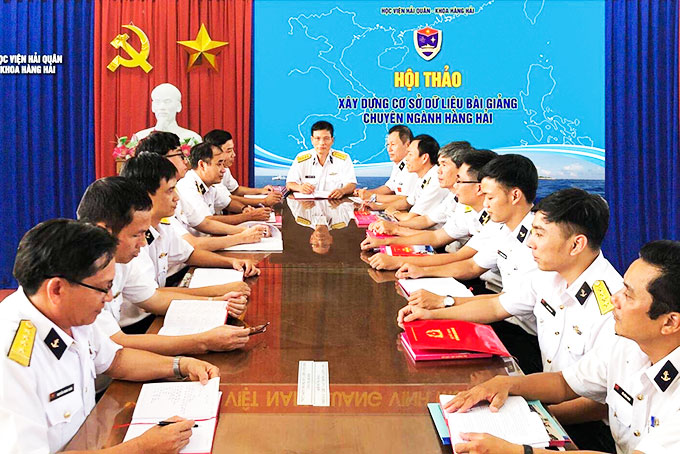
Over the past years, Navy Academy's Maritime Department has focused on improving lecturers' abilities and innovating teaching methods...
Over the past years, Navy Academy’s Maritime Department has focused on improving lecturers’ abilities and innovating teaching methods, contributing to enhancing education, training and scientific research, meeting the requirement in the present situation.
Enhancing staff development
The Maritime Department has placed emphasis upon enhancing the professional development of cadres and lecturers with 80% of lecturers being post-graduates. 6 lecturers have taken PhD courses at home and abroad. 3 lecturers have successfully defended their PhD theses. 4 lecturers have won the title “excellent lecturers” at the level of the Ministry of National Defense & annually 3-4 lecturers win the title at grassroots level, according to Senior Lieutenant Colonel Pham Trung Hieu, Vice-Chief of the Maritime Department, Navy Academy.

|
In addition, the department regularly encourages lecturers to develop their professional competence, foreign languages, computer science and teaching skills and keep up with updated knowledge; especially, focusing on English language skill training and development in order to meet the integration demand and international exchange, 100% of lecturers have met the foreign language standards with 70 possessing the 2nd degree of Bachelor in English. Every year, the department cadres and lecturers are sent to attend regional military workshops, take courses in foreign countries and take part in military foreign affairs on the academy’s Sailing Vessel 286 – Le Quy Don.
Improving teaching quality
Together with improving teaching staff’s ability, the department always takes the lead in innovating teaching methods, applying active teaching methods and adapting to the CDIO imitative that stresses engineering fundamentals set in the context of conceiving, designing, implementing and operating real-world systems and products. Adopted as the framework of curricular planning and outcome-based assessment, CDIO approach uses active learning tools such as group discussion and problem-based learning to promote learners’ self-study, independence and creativity, transforming training into self- training. Testing and assessment have been innovated based on knowledge application to problem-solving rather than knowledge recall.
In the 2018-2019 school year, under the direct guidance of Maritime Department’s lecturers, 6 students major in maritime studies, course 59, successfully defended the graduation theses in English, graded distinction and high distinction for the first time at Navy Academy. Scientific research was promoted, focusing on navigation and maritime security, scientific and technological application into teaching.
In recent years, the maritime department has presided over and conducted many studies, including completing and approving 3 projects at the level of the Ministry of National Defense, 6 at sector and military branch levels; 1 initiate and learning model winning the 1st prize at military level; 2 initiatives and learning models winning the 1st and 3rd prize at military branch levels; 14 initiatives and learning models at academy level; 34 studies at department level; and compiled 6 teaching materials, 27 at academy level, 53 at department level, 73 curricular materials and 18 tests for question banks, etc.
The Maritime Department has well fulfilled assigned tasks and taken the lead in the emulation campaign with outstanding achievements and experience, contributing to promoting solidarity and creativity in educational innovation, quality improvement and scientific research, meeting the requirement in the new situation, reports Colonel, PhD Nguyen Duc Nam, Vice-Director of Naval Academy.
The Anh
Translated by N.T






